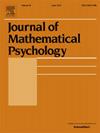无规律性的随机效用
IF 1.5
4区 心理学
Q2 MATHEMATICS, INTERDISCIPLINARY APPLICATIONS
引用次数: 0
摘要
经典的随机实用模型暗示了一种称为规律性的一致性。满足规律性的决策者从一组可选选项x中选择选项x的可能性至少与从包含x的更大集合Y中选择选项x的可能性一样大。鉴于违反规律性的情境依赖选择的大量经验证据,一些研究人员质疑所有随机实用模型的描述性有效性。在本文中,我们表明并非所有的随机实用新型都意味着规律性。我们为随机实用新型提出了一个通用框架,以适应上下文依赖性和可能违反规律性。在数学上,与经典模型一样,上下文相关的随机实用新型形成凸多面体。它们通过在两个或多个上下文中指定偏好排名的组合,对做出选择的那些选择集产生行为预测。我们讨论了上下文相关模型如何比经典模型更少或更简洁。具有或不具有规律性的随机实用新型可以用现代的顺序约束推理方法进行测试。本文章由计算机程序翻译,如有差异,请以英文原文为准。
Random utility without regularity
Classical random utility models imply a consistency property called regularity. Decision makers who satisfy regularity are at least as likely to choose an option from a set of available options as from any larger set that contains . In light of ample empirical evidence for context-dependent choice that violates regularity, some researchers have questioned the descriptive validity of all random utility models. In this article, we show that not all random utility models imply regularity. We propose a general framework for random utility models that accommodate context dependence and may violate regularity. Mathematically, like the classical models, context-dependent random utility models form convex polytopes. They yield behavioral predictions for those choice sets from which choices are made, by specifying combinations of preference rankings across two or more contexts. We discuss how context-dependent models can be less or more parsimonious than the classical models. Random utility models with or without regularity can be tested with contemporary methods of order-constrained inference.
求助全文
通过发布文献求助,成功后即可免费获取论文全文。
去求助
来源期刊

Journal of Mathematical Psychology
医学-数学跨学科应用
CiteScore
3.70
自引率
11.10%
发文量
37
审稿时长
20.2 weeks
期刊介绍:
The Journal of Mathematical Psychology includes articles, monographs and reviews, notes and commentaries, and book reviews in all areas of mathematical psychology. Empirical and theoretical contributions are equally welcome.
Areas of special interest include, but are not limited to, fundamental measurement and psychological process models, such as those based upon neural network or information processing concepts. A partial listing of substantive areas covered include sensation and perception, psychophysics, learning and memory, problem solving, judgment and decision-making, and motivation.
The Journal of Mathematical Psychology is affiliated with the Society for Mathematical Psychology.
Research Areas include:
• Models for sensation and perception, learning, memory and thinking
• Fundamental measurement and scaling
• Decision making
• Neural modeling and networks
• Psychophysics and signal detection
• Neuropsychological theories
• Psycholinguistics
• Motivational dynamics
• Animal behavior
• Psychometric theory
 求助内容:
求助内容: 应助结果提醒方式:
应助结果提醒方式:


